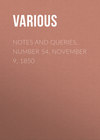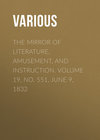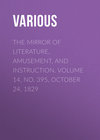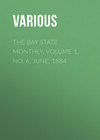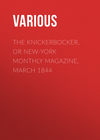Loe raamatut: «Chambers's Edinburgh Journal, No. 443», lehekülg 6
THINGS TALKED OF IN LONDON
June 1852.
As usual, everything shews in this month that our season will soon be past its perihelion: soirées, whether scientific, exquisite, or political, take place almost too frequently for the comfort and wellbeing of the invited; and loungers and legislators are alike beginning to dream of leafy woods and babbling brooks. Our learned societies have brought their sessions to a close, with more or less of satisfaction to all concerned, the Royal having elected their annual instalment of new Fellows, and the Antiquaries having decided to reduce their yearly subscription from four guineas to two, with a view to an increase and multiplication of the number of their members, so that the study of antiquity may be promoted, and latent ability or enthusiasm called into play. The British Association are making preparations for their meeting at Belfast, and if report speak truth, the result of the gathering will be an advancement of science in more than one department. Concerts, musical gatherings, spectacles, are in full activity, the entrepreneurs seizing the moments, and coins too, as they fly. In short, midsummer has come, and fashion is about to substitute languor for excitement. Meantime, our excursion trains have commenced their trips to every point of the compass; and during the next few months, thousands will have the opportunity of exploring the finest scenery of our merry island at the smallest possible cost; and for one centre of attraction, as London was last year, there will now be a hundred.
The award of Lord Campbell on the bookselling question has given a great triumph to the innovating party, to which the authors to a man, and the great bulk of the public, had attached themselves. The Trade, as the booksellers call themselves, while admitting that they can no longer stand under a protective principle, feel certain difficulties as to their future career, for unquestionably there is something peculiar in their business, in as far as a nominal price for their wares is scarcely avoidable. If so, the question is, How is it to be adjusted? at a lower allowance for the retailer? In that case, some would still undersell others; and the old troubles would still be experienced. Ought there, then, to be no fixed retailing price at all, but simply one for the publisher to exact from the retailer, leaving him to sell at what profit he pleases or can get? In that case, the publisher's advertisement, holding forth no price to the public, would lose half its utility. Shall we, then, leave the retailer to advertise? All of these questions must occupy the attention of booksellers for some time to come, and their settlement cannot speedily be hoped for. The general belief, however, is, that the cost for the distribution of books from the shops of the publishers must be considerably reduced, the prices of books of course lowered, and their diffusion proportionately extended. It will perhaps be found that some of the greatest obstructions that operate in the case are not yet so much as touched upon.
The French have resumed their explorations and excavations at Khorsabad, and will doubtless bring to light many more remains of the arts of Nineveh; and Colonel Rawlinson has found the burial-place of the kings and queens of Assyria, where the bodies are placed in sarcophagi, in the very habiliments and ornaments in which they were three thousand years ago! What an important relic it will be for our rejuvenated Society of Antiquaries to exercise their faculty of investigation upon! If discoveries go on at this rate, we shall soon want to enlarge our British Museum.
The Registrar-General tells us, in his first Report for the present year, that 90,936 persons were married in the last quarter of 1851—a greater number than in any quarter since 1842, except two, when it was slightly exceeded. It is altogether beyond the average, and confirms what has been before observed, that marriages are most numerous in England in the months of September, October, and November, after the harvest. To every 117 of the whole population there was one marriage. On the other hand, births are found to be most abundant in the first quarters of the year; the number for the first three months of the present year was 161,776. 'So many births,' says the Registrar, 'were never registered before in the same time.' In the same period of 1851, it was 157,374; and of 1848, 139,736. The deaths during the three months were 106,682, leaving an increase in the population of 55,094, which, however, disappears in the fact, that 57,874 emigrants left the United Kingdom in the course of the quarter. The mortality, on the whole, was less than in the ten previous winters, owing, perhaps, to the temperature having been 3° above the average; but the difference was more marked in rural districts than in the large towns. According to the meteorological table attached to the Report, it appears that the mean temperature for the three months ending in February was 41°.1, being 4°.2 above the average of eighty years. On the 10th of February, the north-east wind set in, and on seventy nights during the quarter the temperature went below freezing. The movement of the air through January and February was 160 miles per day—in March, 100 miles. Up to February 9, the wind was generally south-west, and rain fell on twenty-three days, and on six days only after that date. These periodical reports, and those of our Meteorological and Epidemiological Societies will doubtless, before long, furnish us with sufficient data for a true theory of cause and effect as regards disease, and for preventive measures.
Gold is, and will be for some time to come, a subject much talked about. Some of our financiers are beginning to be of opinion, that the period is not distant when a great change must be made in the value of our currency—the sovereign, for instance, to be reduced from 20s. to 10s. If so, there would be a good deal of loss and inconvenience during the transition; but, once made, the difficulty would cease. Others, however, consider that the demand for gold for manufacturing purposes and new appliances in the arts, will be so great, that not for many years to come will its increase have any effect on the value of the circulating medium. It will be curious if the result, as not unfrequently happens, should be such as to falsify both conclusions. Connected with this topic is the important one of emigration; and so important is it, that either by public or private enterprise, measures will be taken to insure a supply of labourers to the Australian colonies to replace, if possible, those who have betaken themselves to the diggings. Convicts will not be received; and as something must be done with them, Sir James Matheson has offered to give North Rona, one of the Orkney Islands, to the government for a penal settlement. It has been surveyed, and found to contain 270 acres, sufficient to support a population of 1000. Should the proposal be adopted, it will afford an opportunity for trying an entirely new system of discipline with the criminal outcasts.
Some attention has been drawn to the fact, that our 'Ten Hour Bill' has produced an effect on the other side of the Atlantic. The legislature of Ohio has just passed a 'ten hour law,' to apply to 'all manufactories, workshops, and other places used for mechanical or manufacturing purposes' throughout the state; the penalty to be a fine of from one guinea to ten. Something has already been said about extending its provisions to agricultural labourers and domestic servants—not so easy a task as the other; but when one remembers how desperately hard people are made to work in the United States, it is gratifying to observe ever so small a beginning towards more temperate and life-preserving regulations. In New York, great efforts are made towards establishing female schools of design and female medical colleges, with a view to open to women a wider sphere of employment than that to which they are now restricted. Notwithstanding the objections expressed in many quarters against female physicians, it is certain that they would find favour among a large class of invalids. Another Women's Rights Convention has been held, and an Industrial Congress. One of the questions discussed at the latter was: Why in the United States some have all the work and no property, and others all the property and no work? Harriet Martineau's stories of Political Economy would have helped the debaters to a satisfactory solution.
Our sanitary reformers, also, are felicitating themselves on the spread of their principles to the West, seeing that the first Baths for the People were opened in New York a few weeks since. It appears from accounts which have been sent over, that the edifice cost 30,000 dollars, and is provided with every convenience to insure the end in view—the promotion of cleanliness. The charge for plunge-baths is two cents; for warm-baths, five cents; and first-class baths, ten cents. For washing, a range of stalls extends through the building, in the bottom of which is a contrivance for admitting hot or cold water, as may be desired. The drying machinery is 'arranged after the plan of a window-sash, with weights and pulleys, so as to rise and fall at pleasure. This sliding apparatus, when elevated, is brought into contact with confined heated air for a few minutes, followed by a rapid draught of dry air, which dries the clothes with great rapidity. The same heat is made use of for heating the flat-irons, which are brought from the furnace to the hands of the laundresses on a miniature railway.' With such an establishment as this in full play, the 71,000 emigrants who landed in New York during the first four months of the present year, would have little difficulty in purifying themselves after their voyage.
There is yet another topic of interest from the United States—namely, the earthquake that was felt over a wide extent of country on the 29th of April last. Our geologists are expecting to derive from it some further illustration of the dynamics of earthquakes, as the Smithsonian Institution has addressed a circular to its numerous staff of meteorological observers, calling for information as to the number of shocks, their direction, duration, intensity, effects on the soil and on buildings, &c. There have been frequent earthquakes of late in different parts of the world, and inquiry may probably trace out the connection between them. The centre of intensest action appears to have been at Hawaii, where Mauna Loa broke out with a tremendous eruption, throwing up a column of lava 500 feet high, which in its fall formed a molten river, in some places more than a mile wide. It burst forth at a point 10,000 feet above the base of the mountain.
Dr Gibbons has published a few noteworthy facts with respect to the climate of California, which shew that San Francisco 'possesses some peculiar features, differing from every other place on the coast.' The average yearly temperature is 54°; at Philadelphia it is 51°.50; and the temperature is found to be remarkably uniform, presenting few of those extremes common to the Atlantic states. On the 28th of April last year, it was 84°; on October 19th, 83°; August 18th, 82°—the only day in the three summer months when it rose above 79°. It was 80° on nine days only, six of them being in October; while in Philadelphia it is 80° from sixty to eighty days in the year. In the latter city, the temperature falls below the freezing-point on 100 days in the year, but at San Francisco on twenty-five mornings only. The coldest month is January; the hottest, October. 'In the summer months, there is scarcely any change of temperature in the night. The early morning is sometimes clear, sometimes cloudy, and always calm. A few hours after sunrise, the clouds break away, and the sun shines forth cheerfully and delightfully. Towards noon, or most frequently about one o'clock, the sea-breeze sets in, and the weather is completely changed. From 60° or 65°, the mercury drops forthwith to near 50° long before sunset, and remains almost motionless till next morning.' The summer, far from being the beautiful season it is in other countries, parches up the land, and gives it the aspect of a desert, while the 'cold sea-winds defy the almost vertical sun, and call for flannels and overcoats.' In November and December, or about midwinter, the early rains fall, and the soil becomes covered with herbage and flowers. These are facts which emigrants bound for California will do well to bear in mind.
To come back to Europe. M. Fourcault has addressed a communication to the Académie on 'Remedies against the Physical and Moral Degeneration of the Human Species,' intended more especially for the working-classes. He would have schools of gymnastics and swimming established along the great rivers, and on the sea-shore; gymnastic dispensaries, and clinical gymnastic in towns; and agricultural and other hospitals, combining simple and economical means of water-cure. His clinical gymnastic comprehends three divisions: hygienic or muscular exercise, not violent or long-continued, or productive of perspiration; medical, in which the exercise is to be kept up until perspiration is induced; and orthopedic, which, by means of ropes, bands, and loops attached to a bed, enable the patient to take such straining and stretching exercise as may be likely to rectify any deformity of limb. Whichever method be adopted, it must be carried out conscientiously, because 'feeble muscular contractions, without energy or sustained effort, produce no hygienic, medical, or orthopedic effect.' M. Fourcault may perhaps find some of his objects accomplished in another way, for the Prince President has, by a decree, appropriated 10,000,000 francs to the improvement of dwellings for the working-classes—3,000,000 of the sum being set apart for Paris—and has offered 5000 francs for the best design. If such works as these continue, we shall soon cease to hear that enough is not done for the working-classes; and they will have, in turn, to shew how much they can do for themselves.
A portable electric telegraph has lately been introduced on some of the French railways, by which, in case of accident, the conductors may communicate with the nearest stations. It is all contained in a single box, the lower portion of which contains the battery, the upper, the manipulator and signal apparatus. When required to be used, one of the wires is hooked on to the wires of the telegraph, and the other attached to an iron wedge thrust into the earth. It answers so well, that the directors of the Orleans line have provided thirty of their trains with the portable instruments. In connection with this, I may tell you that Lamont of Munich, after patient inquiry, has come to the conclusion, that there is a decennial period in the variations of the magnetic declination; it increases regularly for five years, and decreases as regularly through another five. If it can be discovered that the horizontal intensity is similarly affected in a similar period, another of the laws of terrestrial magnetism will be added to the sum of our knowledge.












